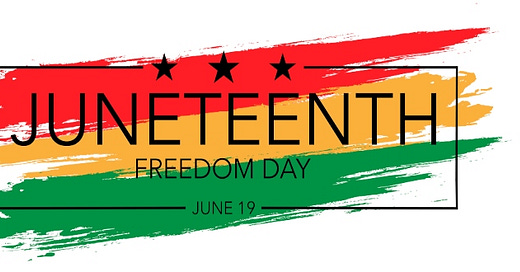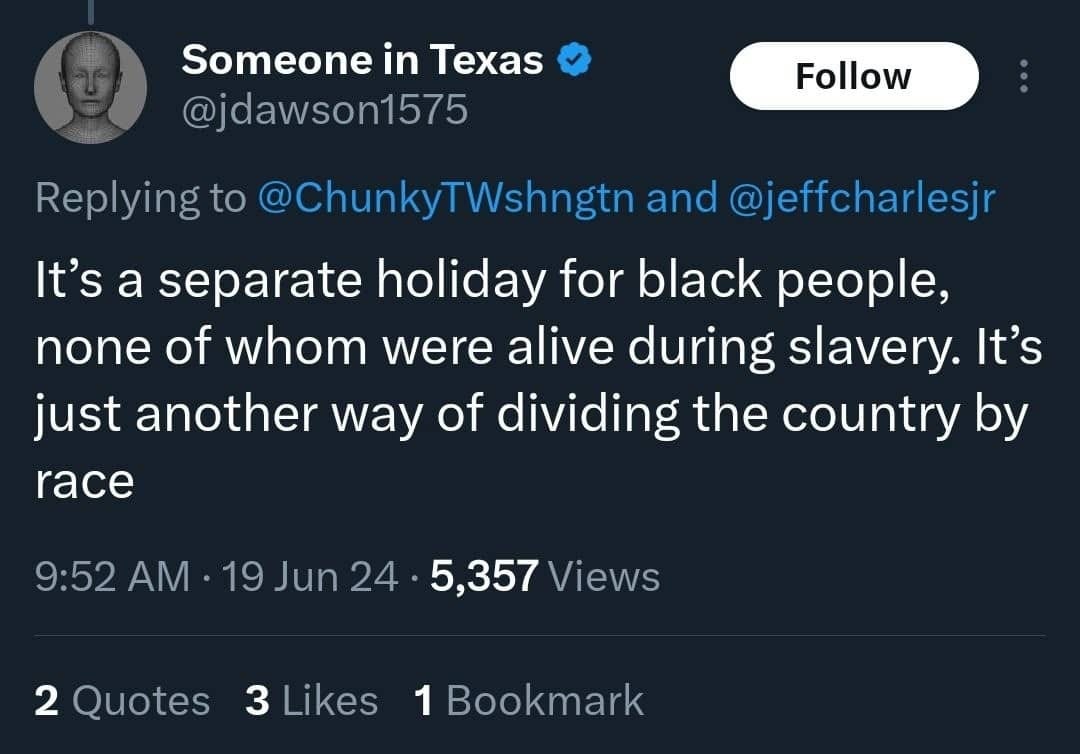Juneteenth and the Paradox of American Conservatism.
A celebration of freedom or a celebration of victimhood?
Conservatives often state and take pride in the fact that, though slavery was a global phenomenon, only the West developed enough moral sense to actively put an end to it while influencing the rest of the world to do the same. This sentiment is often invoked as an example of Western exceptionalism on the issue of slavery. At the same time, many conservatives today express concerns about a holiday celebrating the liberation of American slaves. This is an interesting, if not fascinating, paradox that I intend to explore in this article.
The month of February is Black History Month in America, and June 19th, also known as Juneteenth, is a federal holiday originating in Texas and spreading to the rest of the USA commemorating the end of slavery in the United States. Since this month of June, there have been interesting, if not spicy, comments from some conservative or right-wing figures, especially on Twitter. The sentiments in these comments seem to reveal a distaste for the Juneteenth holiday. And like many things right-wingers claim to "despise,” they end up being its biggest promoters. There are a number of interesting perspectives I’d like to react to and cover in this article.
Let’s start with my long-time hero Professor Glenn Loury. Professor Loury in a recent Substack post declared, “I don’t know if there should even be black studies, I don’t know if black history month should exist”
Alleged Pimp and sex trafficker Andrew Tate, proudly announced on Twitter “Juneteenth isn’t a real holiday its ratchet nigger bullshit” with the tweet garnering over 2.5M views and 23k likes in a few hours.
A right-wing account named “"Someone in Texas”" said, “it’s a separate holiday for black people none of whom were alive during slavery. It’s just another way of dividing the country by race.”

There is a lot to pick apart in the three quotes above. I will start with the first one.
I don’t think Professor Loury is confused about whether black studies or black history month should exist. I suspect he doesn’t believe they should exist, which is strange considering the fact that black studies is American studies and black history is American history. I may understand his reservation about the way black studies is being taught; if the framing is to paint black people as perpetual victims, he may have a point, but only in so far as to say that black people today are not victims despite the real tragedies their ancestors endured in America. A more productive way would be for Professor Loury to champion that black history be taught as a story of victory against the odds of slavery, Jim Crow, and segregation rather than one of victimhood.
The US has a very complex history with many parts and layers, and black history is a big part of that history. To exclude black history from American history is to endorse the world view of Ann Coulter, that any history or study that isn’t connected with WASP American culture or history isn’t American history and should not exist.
I find Professor Loury’s “confusion” to be performative. He knows his audience doesn’t want black studies and black history to exist, but instead of saying it out loud, he frames it as confusion. I am not accusing Professor Loury of cowardice; I’m simply saying he’s performing and putting up a show, and what’s the point of a show if it doesn’t have tension? His alleged confusion provides the necessary tension. It feels like Professor Loury is saying, “I’m not saying black history month shouldn’t exist; I’m just questioning why it should exist." That’s way more interesting than outright saying it should or shouldn’t exist. Professor Loury knows very well why both black studies and black history month should exist, because black history is American history and black studies is American studies. Nothing more, nothing less.
I hate to do whataboutisms, but I’ll do one anyway. Saying I don’t know if Black History Month should exist is like saying I don’t know if Jewish people should celebrate Hannukah or commemorate Holocaust Remembrance Day, when these holidays hold deep significance for the Jewish people. Their celebration is not an affront to anybody, the same way Black History Month is not an affront to white people but a commemoration of what a certain demographic of the US went through and overcame. Black History should be seen as a subset of a larger American history and celebrated as an incredible achievement of the American project that continuously strives towards the ideal drafted by its founding fathers, to have a more perfect union.
Moving on to Andrew Tate. Tate’s tweet—“Juneteenth isn’t a real holiday; its ratchet nigger bullshit”—I believe not only comes from a place of profound ignorance but also from a place of bigotry. And no, the fact that Tate is half black doesn’t make it any less bigoted. People are capable of being bigoted or even racist towards their own group or race.
Juneteenth is a real holiday celebrated as far back as 1866, formally recognized by Texas in 1938 by proclamation and 1979 by legislation, and as a federal holiday in 2021. Given these facts, it’s safe to say that Andrew Tate was talking out of his ass. The use of the word Rachet by Tate invokes the stereotype of black people being uncouth and uncultured, etc. The truth is, many respectable black people, including black conservatives, celebrate Juneteenth. Does that make them rachet? Perhaps Tate doesn’t know that not every black person lives in the hood and behaves like sexy red. Finally, his use of the words “nigger bullshit” is nothing but racist, and his being black doesn’t make it any less so.
Lastly, “Someone in Texas” tweeted, “Juneteenth is a separate holiday for black people, none of whom were alive during slavery. It’s just another way of dividing the country by race.” This comment makes absolutely no sense. Is it a separate holiday for black people? No, it’s an American holiday celebrating the freeing of Americans from slavery. Anyone can partake in it. The fact that some Americans feel offended by it reveals more about them than the holiday itself. The idea that Juneteenth should not be celebrated because those celebrating it today were not alive during slavery is a brain-dead take. The point of historical holidays is for people in the future directly removed from the event to memorialize it because of its significance. I suppose someone in Texas celebrates the American day of independence on July 4th, but why should he or any American, for that matter, celebrate July 4th when no one today was alive for the American declaration of independence on July 4th, 1776?
Someone in Texas is able to voice such stupidity because he sees Juneteenth as a celebration of slavery rather than a celebration of freedom. That’s his problem.
Conclusively, why do some conservatives have a visceral reaction to any celebration related to black people? Do they see them as a reminder of a sordid history they’d like to forget, or do those celebrations prick their conscience and make them feel responsible for their ancestors’s actions? My question is, why does a history they didn’t partake in bother them so much? Why do they feel accused or responsible when it is only incidental that they are related to people in the past who did terrible things? “The son shall not bear the iniquity of the father, nor shall the father bear the iniquity of the son; the righteousness of the righteous shall be upon him, and the wickedness of the wicked shall be upon him.” —Ezekiel 18:20. If I were a white American, such celebrations wouldn’t bother me in the least, as I am not guilty of anything.
If you’ve enjoyed my writings on Substack, kindly support me on Patreon to encourage open and challenging discourse. Like, share, and subscribe to this Substack and leave a comment. I will be sure to respond to them.
About the Host
Charles Ekokotu (Pharm. D.) is a bibliophile, prose fiction writer, poet, and playwright. His first novel, Hotel Shendam—a crime fiction novel featuring a debate on race and colonialism—is available on Amazon. If you love interesting crime fiction thrillers, you would love this.
He also has a collection of poems called Fairy Tales, now available on Amazon. Fairy Tales is a collection of poems based on the author's experiences and captures key events in the author's life and his expression of his feelings through poetry. It runs across themes like loss, grief, excitement, nature, romance, and joy
Follow Charles Ekokotu on








Charles another interesting essay, Putting aside the Andrew Tate comments—who while popular among some does not appear to be a serious contributor to public intellectual or policy discourse. I thought your interpretation of Glenn Loury’s comment on black history may have missed his point. Professor Loury is an academic and a public intellectual. I think he framed his statement on black history and black studies as an invitation to his audience to debate the question: Is a separate recognition of black history—or for that matter the history of any other identity group—the best way to highlight blacks contribution to the nation’s history? I would take the negative position—that is, we should not have separate a black history month or separate black studies. Why not?
Black history (as well as all other identity history celebrations) seems to have two objectives: 1. It is intended to serve as a kind of apology to blacks for the horrors and abuses of American slavery and the post civil war Jim Crow; and 2. To highlight the specific contributions of blacks to the nation’s historical development. The results should be greater understanding and comity between blacks and other groups. However, does this identity group recognition and celebration accomplish these outcomes?
The celebration of Black history tends to focus on the historical and continuing victimization of blacks throughout American history. It underscores the identity of blacks as a group apart from the American mainstream. It doesn’t emphasize blacks as an integral part of the American experience but as a separate identity group.
Moreover, the many black intellectual, political, scientific and artistic heroes recognized during black history month are primarily characterized by their blackness rather than their social contributions. For instance, the great writers and intellectuals of the Harlem renaissance are contextualized as contributing to black identity rather than as investing in the growth and development of their respective fields and professions.
It also is hard to say that since the introduction of black history celebrations the understanding and comity between races has improved. Obviously, it is not appropriate or accurate to assign a disproportionate weight to black history’s role in resolving racial progress in the USA. However, it is worth noting that the growing recognition of black history has not always been simultaneously accompanied by improvements in race relations.
Black history and other group identity histories seem to be based on the thesis that a nation’s history can be understood as a collection of identity group narratives. This view is in contrast to the idea that a nation’s history is best understood as an assessment of forces, trends, and significant events that have shaped the growth and development of a nation. In this view we would ask about significant nation shaping themes and events. For example, the shaping of America’s democratic republic is an important—maybe even the core—historical theme or principle of USA history.
Framing the issue in that way, we could discuss the black Civil Rights struggle as separate black history, or as a part of the American process of refining and developing the nation’s democratic republic. We would then think of Martin Luther King on par with Jefferson and the nation’s other founders. The Civil War—the struggle to end American Slavery— is part of this democratizing theme. In this light, we should celebrate the end of slavery as an important event in the shaping of American democracy. (By the way, I don’t understand the need for Juneteenth—why not celebrate the date of the Emancipation Proclamation as the formal end of slavery.)
My argument is that rather than promoting a separate black history we should understand how blacks through individual leaders and social movements have contributed to the refining and development of the American democratic republic.
In general, my argument is that we should understand the underlying themes, historical trends and events which shape a nation’s social development and institutions. This in my opinion is a more challenging task then simply promoting—some might say pandering to—identity group narratives. The payoff is understanding history as a—not always progressive or linear—story about the development of a nation’s institutions, culture and political economy. The task is then to better understand the contributions of a wide variety of individuals and groups to this national development story.
By the way, I did not understand equating black history celebrations to Jewish religious holidays. The comparison seems like a category error.
Well-done, namesake!
- Tate is not only trash, but that's his job; and unfortunately, his lack of thought/depth and phony machismo has an audience, especially these days.
Not much else to say in his case.
- "Someone...", as far as I can tell, is exactly what you think he is.
- But I think you're slightly off about Glenn. I don't think he's (necessarily) performing for an audience.
Trust me. I get what you're saying. But--and please correct me if I am mistaken--Glenn talked about Black Studies and Black History Month, NOT the celebration of a huge moment in American history.
I can relate to where he's coming from...somewhat. In other words, since African-American history IS American history, why do we need a month to focus on African-American history specifically? Shouldn't we instead insist that ALL history be taught fully and rigorously in context? Presumably then we wouldn't need a month reserved for African-American history, or Hispanic Heritage, or Asian American and Pacific Islander Heritage, etc.
I think it's a fair and interesting question. (And fwiw, I am still grappling with it.)
Similarly, I see no problem in studying Black history, or Black music, or Black literature or fashion, etc. But what is Black or African-American Studies? Everything African-American? There is something odd about that phrase.
Heck, even "American Studies" would need clarification to some extent. It feels a little contrived.
Again, this is a question. Not a statement.